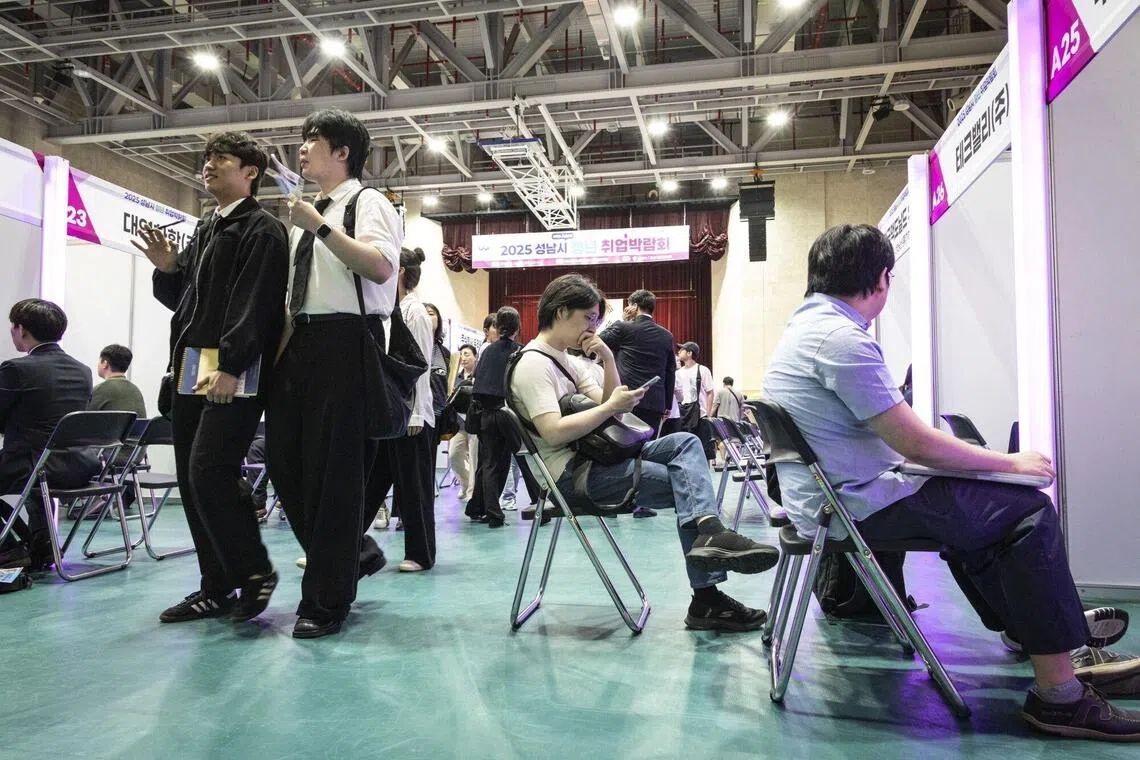South Korea’s 4½-day work week plan stirs business backlash
Sign up now: Get insights on Asia's fast-moving developments

The average Korean worked 1,874 hours a year in 2023. President Lee Jae Myung is ultimately aiming for a four-day work week, or 32 hours a week.
PHOTO: BLOOMBERG
SEOUL - The South Korean government is pushing ahead with a 4½-day working week, a flagship campaign pledge of President Lee Jae Myung, drawing concern from the business community, which warns that reduced hours could undermine productivity and drive up costs.
On the campaign trail, Mr Lee proposed reducing the statutory working week from 40 hours to 36 hours without a pay cut, with a goal of bringing South Korea’s average annual working hours below the OECD average of 1,742 hours by 2030.
The average South Korean worked 1,874 hours a year in 2023. Mr Lee is ultimately aiming for a four-day working week, or 32 hours of work a week.
The Ministry of Government Legislation said last week that it plans to submit a new Bill to reduce working hours to the National Assembly by the end of 2025 as part of 123 planned government legislative initiatives.
The new legislation, tentatively called the Reduced Working Hours Support Act, is expected to introduce subsidies and tax breaks for companies that adopt shorter hours.
The Ministry of Employment and Labour on Sept 24 launched a tripartite task force consisting of labour unions, business groups and government agencies to come up with a road map for cutting hours.
The push comes 14 years after the country’s five-day working week was fully adopted in 2011, after a decade of phased implementation.
Proponents say cutting working hours would improve work-life balance, prevent burnout and tackle South Korea’s alarming birth rate decline.
“The 4½-day work week is not only the solution to overcoming the nation’s low growth and regional population decline, as recently pointed out by President Lee Jae Myung, but also the only key to resolving South Korea’s low birth rates and sluggish growth,” said Mr Kim Hyung-sun, chief of the Korean Financial Industry Union, ahead of a strike demanding a 4½-day working week and higher wages.
The business community, however, has raised concerns that reducing working hours without boosting productivity could threaten companies already facing higher labour costs and economic uncertainty.
It says the proposed initiative is premature, given that South Korea’s productivity lags well behind leading economies.
OECD statistics show that, in 2023, South Korean workers generated US$54.64 (S$70.50) in gross domestic product an hour, nearly half that of American workers at US$97.05, and considerably less than Germany’s US$93.72, France’s US$87.30 and Spain’s US$70.60.
“When Korea’s labour productivity is far below that of advanced economies, simply reducing statutory working hours will undermine corporate competitiveness,” the Korean Enterprises Federation said.
“Priority should instead be placed on introducing flexible work arrangements and improving the special overtime approval system so that labour and management can choose hours more flexibly.”
Small businesses warn they could be hit the hardest.
“If the law expands to cover businesses with fewer than five employees, overtime pay will be applied starting Friday afternoons, when customers are at their peak,” said Mr Song Chi-young, head of the Korea Federation of Micro Enterprises.
“The burden will then fall entirely on small business owners, which will be difficult for them.”
A recent study by the Sustainable Growth Initiative (SGI), a think-tank under the Korea Chamber of Commerce and Industry, also cautioned that without productivity gains, a shorter working week would widen the gap between wages and output, particularly in labour-intensive industries.
The SGI found that South Korea’s annual labour productivity per worker was at US$65,000 in 2023, ranking 22nd among 36 OECD countries.
That level is roughly half of Belgium’s at US$125,000 and Iceland’s at US$144,000, which have already introduced four-day working weeks, and well below France, Germany and Britain, which are running pilot programmes for shorter weeks.
It will be difficult for South Korea – at roughly two-thirds the level of advanced economies now debating reduced working weeks – to close its income gap with richer nations unless productivity improves, it added.
“Reduced working hours can boost job satisfaction and spur consumption due to increased leisure time,” the think-tank said in a report. “But without gains in hourly productivity, annual output will fall and labour costs will rise, increasing the burden on businesses.”
The study also found that wage growth has significantly outpaced productivity gains in recent years, causing the disparity to accelerate rapidly.
Wages and productivity grew in tandem from 2000 to 2017 at an average of around 3.2 per cent annually. But this trend changed from 2018 to 2023, when wages increased at an average of 4 per cent while productivity rose only 1.7 per cent. THE KOREA HERALD/ASIA NEWS NETWORK


